escapes the ear [being only potentially audible, not actually]. So, in the case of other objects of sense, extremely small constituents are unnoticed; because they are only potentially not actually [perceptible e.g.] visible, unless when they have been parted from the wholes. So the footlength too exists potentially in the two-foot length, but actually only when it has been separated from the whole. But objective increments so small as those above might well, if separated from their totals, [instead of achieving 'actual' exisistence] be dissolved in their environments, like a drop of sapid moisture poured out into the sea. But even if this were not so [sc. with the objective magnitude], still, since the [subjective] of sense-perception is not perceptible in itself, nor capable of separate existence (since it exists only potentially in the more distinctly perceivable whole of sense-perception), so neither will it be possible to perceive [actually] its correlatively small object [sc. its quantum of pathema or sensible quality] when separated from the object-total. But yet this [small object] is to be considered as perceptible: for it is both potentially so already [i.e. even when alone], and destined to be actually so when it has become part of an aggregate. Thus, therefore, we have shown that some magnitudes and their sensible qualities escape notice, and the reason why they do so, as well as the manner in which they are still perceptible or not perceptible in such cases. Accordingly then when these [minutely subdivided]
sensibles have once again become aggregated in a whole in such a manner, relatively to one another, as to be perceptible actually, and not merely because they are in the whole, but even apart from it, it follows necessarily [from what has been already stated] that their sensible qualities, whether colours or tastes or sounds, are limited in number.
One might ask:- do the objects of sense-perception, or the movements proceeding from them ([since movements there are,] in whichever of the two ways [viz. by emanations or by stimulatory kinesis] sense-perception takes place), when these are actualized for perception, always arrive first at a spatial middle point [between the sense-organ and its object], as Odour evidently does, and also Sound? For he who is nearer [to the odorous object] perceives the Odour sooner [than who is farther away], and the Sound of a stroke reaches us some time after it has been struck. Is it thus also with an object seen, and with Light? Empedocles, for example, says that the Light from the Sun arrives first in the intervening space before it comes to the eye, or reaches the Earth. This might plausibly seem to be the case. For whatever is moved [in space], is moved from one place to another; hence there must be a corresponding interval of time also in which it is moved from the one place to the other. But any given time is divisible into parts; so that we should assume a time when the sun's ray was not as yet seen, but was still travelling in the middle space.
Now, even if it be true that the acts of 'hearing' and 'having heard', and, generally, those of 'perceiving' and 'having perceived', form co-instantaneous wholes, in other words, that acts of sense-perception do not involve a process of becoming, but have their being none the less without involving such a process; yet, just as, [in the case of sound], though the stroke which causes the Sound has been already struck, the Sound is not yet at the ear (and that this last is a fact is further proved by the transformation which the letters [viz. the consonants as heard] undergo [in the case of words spoken from a distance], implying that the local movement [involved in Sound] takes place in the space between [us and the speaker]; for the reason why [persons addressed from a distance] do not succeed in catching the sense of what is said is evidently that the air [sound wave] in moving towards them has its form changed)[granting this, then, the question arises]: is the same also true in the case of Colour and Light? For certainly it is not true that the beholder sees, and the object is seen, in virtue of some merely abstract relationship between them, such as that between equals. For if it were so, there would be no need [as there is] that either [the beholder or the thing beheld] should occupy some particular place;since to the equalization of things their being near to, or far from, one another makes no difference.
Now this [travelling through successive positions in the medium] may with good reason take place as regards Sound and Odour, for these, like [their media] Air and Water, are continuous, but the movement of both is divided into parts. This too is the ground of the fact that the object which the person first in order of proximity hears or smells is the same as that which each subsequent person perceives, while yet it is not the same.
Some, indeed, raise a question also on these very points; they declare it impossible that one person should hear, or see, or smell, the same object as another, urging the impossibility of several persons in different places hearing or smelling [the same object], for the one same thing would [thus] be divided from itself. The answer is that, in perceiving the object which first set up the motion- e.g.
a bell, or frankincense, or fire- all perceive an object numerically one and the same; while, of course, in the special object perceived they perceive an object numerically different for each, though specifically the same for all; and this, accordingly, explains how it is that many persons together see, or smell, or hear [the same object]. These things [the odour or sound proper] are not bodies, but an affection or process of some kind (otherwise this [viz.simultaneous perception of the one object by many] would not have been, as it is, a fact of experience) though, on the other hand, they each imply a body [as their cause].















